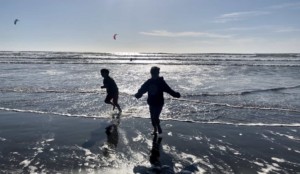Step Outside: Have an Awe-some Summer

What’s one thing you hope the young people in your life do this summer?
I recently asked a version of this question to the grandfather of one of my students.
Without hesitation, he leaned forward and said with conviction, “I’d say, get off those screens!”
I couldn’t agree more.
Come September, what will young people look back on the summer and remember? Will their highlight reel be an endless stretch of mornings, afternoons, and evenings in their bedroom, faces down, staring into their phones? For too many students, this has been a necessary reality for more than a year.
My fondest hope for young people this summer is that they spend as many hours as possible screen-free, talking to people in three dimensions rather than two. The blue canopy sky above has much more to commend it than the blue-light glow of a phone.
Recent research shows a remarkably strong link between green space and mental health. Young people who grow up near more greenery—literally more vegetation in their immediate neighborhood—are less likely to suffer from depression, anxiety, and a range of other mental health afflictions. This is true whether children are growing up in cities (think parks and street trees) or in rural communities. And the dose-response relationship between greenery and mental health holds even when controlling for socioeconomic status and other risk factors.
What’s so special about nature? Many things, probably. One is that natural beauty tends to grab our attention “modestly” as some cognitive scientists put it. The sun, moon, and stars call to us gently, inviting us to observe and reflect and sometimes filling us with awe. In contrast, social-media feeds, automatically advancing Netflix episodes, and pop-up ads are attention bullies—forcing us to effortfully resist them.
Don’t let the young people in your life spend this precious season glued to their devices. You love them too much.
Do plan a picnic in the park, a hike in the woods, or even a walk around the block. And give young people the freedom to explore on their own. “I think that I shall never see,” Joyce Kilmer wrote, “a poem lovely as a tree.”
For more, see:
Angela Duckworth is the Founder and CEO of Character Lab. She is also the Rosa Lee and Egbert Chang Professor at the University of Pennsylvania, faculty co-director of the Penn-Wharton Behavior Change for Good Initiative, and faculty co-director of Wharton People Analytics. Her first book, Grit: The Power of Passion and Perseverance, is a #1 New York Times best seller. Connect with Character Lab on Twitter, Facebook, LinkedIn and Instagram.
This post was originally published on CharacterLab.org.
Stay in-the-know with innovations in learning by signing up for the weekly Smart Update.








0 Comments
Leave a Comment
Your email address will not be published. All fields are required.